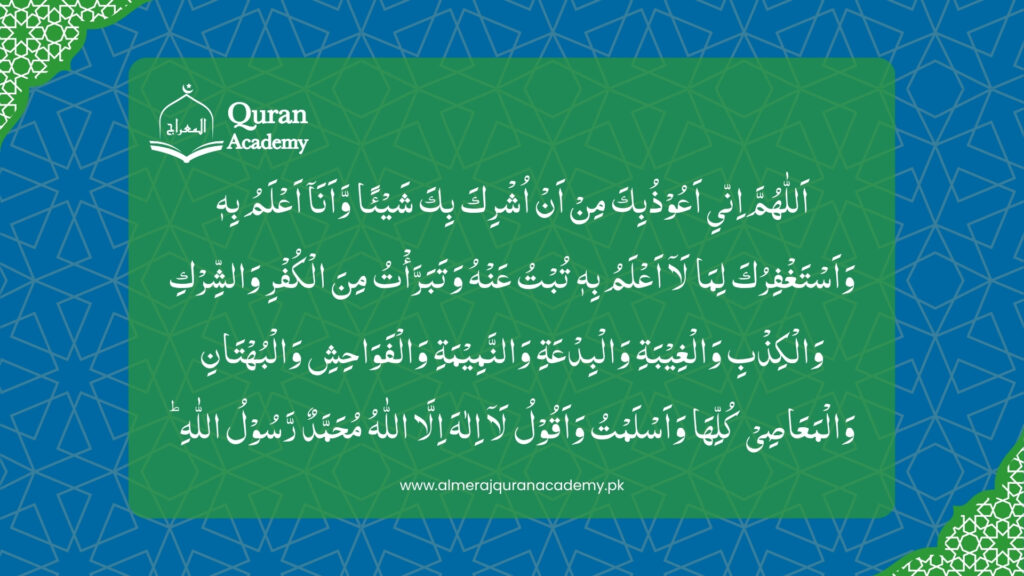The sixth Kalima can be recited anywhere—whether at home, in the mosque, or even at the workplace—since supplications, duas, and worship are not limited to specific locations, unlike Hajj and Umrah, which must be performed at Masjid Al-Haram in Mecca. Similarly, there are no fixed times for reciting the sixth Kalima; it can be said anytime during the day or night according to one’s convenience. However, many consider it best to recite it at night before sleeping, as it requires focus due to its important meaning, but ultimately, it can be recited whenever one finds the time.
Sixth Kalma
Kalima Radd-al-Kufr
The Sixth Kalima, also known as Kalima Radd-al-Kufr (Declaration of Rejecting Disbelief), is the final one among the six Kalimas in Islamic teachings. The word “Radd” signifies rejection, while “Kufr” refers to disbelief. This Kalima is a declaration of turning away from all forms of disbelief.
Linguistically, “Kufr” means to hide or conceal. In Islamic understanding, it describes those who hide or deny the truth of Allah’s Oneness. The essence of the Sixth Kalima is a believer’s plea to Allah سُبْحَانَهُ وَتَعَالَى for protection against disbelief in any form.
Disbelief can appear in different forms, including:
Verbal Disbelief (Kufr bil-Qaul): Expressing denial through words
Action-Based Disbelief (Kufr bil-Fa’el): Showing rejection through actions
Belief-Based Disbelief (Kufr bil-I’tiqad): Denying with the heart or belief
Additionally, disbelief can be major or minor, depending on its severity. By reciting the Sixth Kalima, a Muslim seeks refuge from all types and levels of disbelief.
Radd Kufr (Word of Rejection of Disbelief)
Allahumma innii a’udhu bika min an ushrika bika shai-anw- wa ana a’lamu bihii. Was tagh fi ru ka limaa laa alamu bihee. Tubtu anhu wa tabarra-tu min al-kufri wash-shirki wal-kizdhbi wal-ghiibati wal-bid’ati wan-namiimati wal fawaahishi wal-buhtani w-al-ma’aasii kulliha. Wa aslamtu wa aquulu La illaha illAllahu Muhammadur RasulAllah
O Allah! I seek protection in You from that I should not join any partner with You and I have knowledge of it. I seek Your forgiveness from that which I do not know. I repent from it (ignorance) and I reject disbelief and joining partners with You and of falsehood and slandering and innovation in religion and tell-tales and evil deeds and the blame and the disobedience, all of them. I submit to Your will and I believe and I declare: There is none worthy of worship except Allah and Muhammad [PBUH] is His Messenger
اَللّٰهُمَّ اِنّىِ اَعُوْذُبِكَ مِنْ اَنْ اُشْرِكَ بِكَ شَيْئًا وَّاَنَآ اَعْلَمُ بِهٖ وَاَسْتَغْفِرُكَ لِمَا لَآ اَعْلَمُ بِهٖ تُبْتُ عَنْهُ وَتَبَرَّأْتُ مِنَ الْكُفْرِ وَالشِّرْكِ وَالْكِذْبِ وَالْغِيْبَةِ وَالْبِدْعَةِ وَالنَّمِيْمَةِ وَالْفَوَاحِشِ وَالْبُهْتَانِ وَالْمَعَاصِىْ كُلِّهَا وَاَسْلَمْتُ وَاَقُوْلُ لَآ اِلٰهَ اِلَّا اللّٰهُ مُحَمَّدٌ رَّسُوْلُ اللّٰهِ

The Significance of Kalima Radd-al-Kufr - Sixth Kalma
All six Kalimas share a fundamental purpose: affirming and testifying to the Oneness of Allah سُبْحَانَهُ وَتَعَالَى and the Prophethood of Muhammad ﷺ. The Sixth Kalima, known as Kalima Radd-al-Kufr, reinforces this message with greater clarity and depth. It serves as a heartfelt plea from the believer, asking Allah for protection from actions that contradict the core belief of Islamic monotheism.
Additionally, this Kalima is a call for Allah’s protection from sinful behaviors that oppose Islamic values—such as slander, false speech, gossip, and most importantly, shirk (associating partners with Allah). It also seeks to safeguard the believer from various forms of disbelief, whether they arise from denial, arrogance, hypocrisy, or doubt.
In essence, the Sixth Kalima expresses:
A request for Allah’s protection against all forms of Kufr (disbelief)
A plea for refuge from Shirk, even if done unknowingly
A commitment to avoid falsehood, slander, backbiting, and indecency
A declaration of the reciter’s acceptance of Islam
A confirmation of complete faith in the Oneness of Allah and rejection of any other deity
A testimony that Muhammad ﷺ is the final Messenger
Although the precise wording of the Kalimas is not directly found in the Quran or Hadith in this form, their meanings and themes are deeply rooted in both.
Kalima Radd-al-Kufr – Core Beliefs:
Belief in the Oneness of Allah (Tawheed)
Belief in the Finality of Prophethood of Muhammad ﷺ
Rejection of Shirk (associating partners with Allah)
Affirmation of Faith (Iman) from the heart and tongue
Seeking Forgiveness and Repentance from Sins
Protection from Kufr (disbelief) and hypocrisy
Declaration of entering Islam with sincerity
Belief in Allah’s Mercy and Forgiveness
Condemnation of falsehood, slander, and backbiting
Commitment to worship Allah alone and follow His commands
Reciting Kalima Radd-al-Kufr – When & Where?
How Often Should We Recite Kalima Radd-al-Kufr?
Since there is no set time or place for reciting the sixth Kalima, there is also no fixed number of times it must be repeated. Although it is longer than the other five Kalimas and may be harder to memorize, we should still make an effort to learn it by heart for easy recitation whenever needed. Ideally, try to recite it at least a couple of times every day.
Incorporate Kalima Radd-al-Kufr into Our Daily Life
The core message of this Kalimah centers on the Oneness of Allah سُبْحَانَهُ وَتَعَالَى. The person reciting it asks Allah for protection against any actions that contradict this fundamental belief. Along with this, they seek refuge from other wrong behaviors like lying and backbiting.
When we look deeper, this Kalimah aims to help a person become an ideal Muslim. Its prayers focus mainly on an individual’s spiritual life. Asking Allah to protect us from disbelief (Kufr) is the foundation of true faith. This is a very personal matter, but the Kalimah also seeks protection from sinful acts that affect not just the individual but the wider community. Therefore, its influence is vast, beginning with personal improvement and ultimately contributing to building a strong Muslim society.
Because of this, we should first apply the teachings of this Kalimah in our own lives and then encourage others to do the same, helping to create a pure and complete Muslim culture.
Benefits of the Kalima Radd-al-Kufr Based on the Quran and Hadith
Reciting Kalima Radd-al-Kufr offers protection from all types of disbelief, a fact that is well supported by various verses from the Quran. For instance, the 34th verse of Surah Al-Baqarah mentions disbelief caused by arrogance.
Translation – And ˹remember˺ when We said to the angels, “Prostrate before Adam,”1 so they all did—but not Iblîs,2 who refused and acted arrogantly,3 becoming unfaithful.
[Al-Baqarah 2:34]
The 146th verse of Surah Al-Baqarah discusses disbelief through denial and hiding the truth.
Translation – Those We have given the Scripture recognize this ˹Prophet˺ as they recognize their own children. Yet a group of them hides the truth knowingly.
[Al-Baqarah 2:146]
Similarly, the 14th verse of Surah An-Naml talks about disbelievers
Translation – And, although their hearts were convinced the signs were true, they still denied them wrongfully and arrogantly. See then what was the end of the corruptors!
[An-Naml 27:14]
Moreover, Hadith number 3067 from Jami At-Tirmidhi deals with the issue of shirk
Translation – “When (the following) was revealed: It is those who believe and confuse not their belief with Zulm (wrong) (6:82) – That bothered some Muslims, so they said: ‘O Messenger of Allah! Which of us has not wronged himself?’ He said: ‘It is not that, it is only Shirk, have you not heard what Luqman said to his son: O my son! Do not commit Shirk with Allah. Verily Shirk is a tremendous Zulm (wrong) (31:13).'”
[3067 Jami At-Tirmidhi]
Therefore, the benefits and significance of reciting the sixth Kalima (Kalima Radd-al-Kufr) are clearly supported by both the Quran and authentic Hadiths. It is recommended to keep reciting this Kalima regularly to strengthen your faith and to remain steadfast on the path of righteousness.

